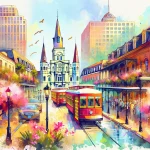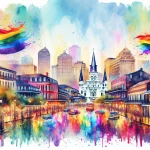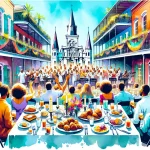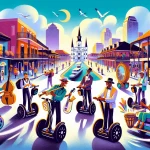New Orleans exudes a distinctive blend of cultures, intertwined by its storied past, diverse influences, and an innate passion for revelry. From the lively celebrations of Mardi Gras to the soulful rhythms of jazz, the city’s events and festivals pay homage to its unique spirit and dedication to preserving its cultural legacy.
In This Article
TL;DR
- New Orleans boasts a thriving cultural scene with numerous festivals and events showcasing its distinct fusion of French, Spanish, African, and Creole influences.
- Local festivals and events play a crucial role in fostering community spirit, upholding traditions, and showcasing the city’s artistic and culinary prowess.
- Iconic events like Mardi Gras and the New Orleans Jazz & Heritage Festival have gained global recognition, reflecting the city’s unique cultural amalgamation.
Historical Context of New Orleans Events
New Orleans’ cultural tapestry is intricately woven from the threads of its diverse history. Established by the French in 1718, the city’s cultural fabric was further enriched by Spanish and African influences, creating a unique blend that permeates every aspect of life, including its vibrant events and festivals.
Major Annual Events and Their Significance
Mardi Gras: Origins and Current Practices
Mardi Gras, the annual celebration culminating on the day before Ash Wednesday, is undoubtedly New Orleans’ most renowned event. This vibrant festival is a kaleidoscope of colorful parades, elaborate costumes, and infectious music that draws visitors from around the world.
The festivities begin on Epiphany (January 6th) and reach their crescendo on Mardi Gras Day, when the streets of New Orleans come alive with revelers adorned in purple, green, and gold. The iconic parades feature elaborate floats, marching bands, and krewes (social clubs) that toss beads and trinkets to the cheering crowds.
New Orleans Jazz & Heritage Festival: History and Global Influence
The New Orleans Jazz & Heritage Festival, affectionately known as Jazz Fest, is a celebration of the city’s rich musical heritage and its influence on global culture. Held annually over two weekends in late April and early May, this festival attracts music lovers from around the world to experience the best in jazz, blues, Cajun, zydeco, and more.
With multiple stages showcasing both local and international acts, Jazz Fest offers a unique opportunity to immerse oneself in the soulful rhythms that have made New Orleans a mecca for music enthusiasts. From the iconic Congo Square to the bustling fairgrounds, the festival is a testament to the city’s enduring legacy as the birthplace of jazz.
Essence Music Festival: Celebrating African American Culture and Music
The Essence Music Festival, held annually over the Fourth of July weekend, is a vibrant celebration of African American culture, music, and empowerment. This multi-day event features a diverse lineup of musical performances, seminars, and cultural experiences that attract thousands of attendees from across the nation.
With its roots in the iconic Essence magazine, the festival has become a platform for showcasing the talents of both established and emerging African American artists, while also fostering a sense of community and pride. From soulful R&B to hip-hop and gospel, the Essence Music Festival is a testament to the rich tapestry of African American artistic expression.
Cultural Institutions and Their Roles in Events
Preservation Hall
Situated in the heart of the French Quarter, Preservation Hall is a renowned venue dedicated to keeping the tradition of New Orleans jazz alive. This intimate music hall hosts nightly concerts featuring some of the city’s most talented jazz musicians, offering visitors an authentic and immersive experience.
Beyond its regular performances, Preservation Hall also organizes special events and collaborations with local and international artists, ensuring that the rich legacy of New Orleans jazz continues to thrive and inspire future generations.
The National WWII Museum
While not primarily focused on cultural events, The National WWII Museum in New Orleans plays a significant role in hosting historical commemorations and educational events related to World War II. Through interactive exhibits, lectures, and special programs, the museum offers visitors a deeper understanding of the war’s impact on the city and its residents.
Annual events like the Museum’s Memorial Day and Veterans Day celebrations honor the sacrifices of those who served, while also fostering a sense of community and appreciation for the city’s role in the war effort.
New Orleans Museum of Art
The New Orleans Museum of Art (NOMA) is a cultural hub that extends its reach beyond its impressive art collection. Through a variety of events, including exhibitions, lectures, workshops, and community outreach programs, NOMA serves as a platform for artistic expression and cultural exchange.
From the annual Prospect New Orleans contemporary art triennial to family-friendly events like the Sculpture Garden Celebration, NOMA’s offerings cater to a wide range of interests and provide opportunities for visitors to engage with the city’s vibrant arts scene.
Local Laws and Regulations Impacting Events
While New Orleans is known for its lively and often raucous celebrations, the city has implemented various laws and regulations to ensure the safety and smooth operation of public events.
Organizers of major festivals and parades must obtain permits from the city, which outline specific guidelines for crowd control, noise levels, and public safety measures. These regulations are designed to strike a balance between preserving the city’s festive spirit and maintaining order during large gatherings.
Additionally, local laws govern the sale and consumption of alcohol during events, with strict enforcement measures in place to prevent underage drinking and public intoxication. These measures aim to create a safe and enjoyable environment for all attendees while upholding the city’s reputation for responsible revelry.
Community Involvement in New Orleans Events
New Orleans’ vibrant cultural scene is deeply rooted in the active participation and involvement of its diverse communities. From neighborhood block parties to large-scale festivals, the city’s residents play a crucial role in organizing and sustaining these events.
Local community organizations and neighborhood associations often collaborate to plan and execute smaller-scale festivals and celebrations that showcase the unique character and traditions of their respective areas. These events not only foster a sense of pride and belonging but also provide opportunities for cultural exchange and cross-community engagement.
Moreover, many of the city’s major events rely heavily on the dedication and hard work of volunteers from the local community. From assisting with logistics and crowd management to participating in parades and performances, these volunteers are the lifeblood of New Orleans’ cultural celebrations, ensuring their continued success and authenticity.
Economic Impact of Major Events on New Orleans
The cultural events and festivals that take place in New Orleans are not only a source of pride and entertainment but also a significant economic driver for the city and its residents.
Major events like Mardi Gras and Jazz Fest attract millions of visitors annually, generating substantial revenue for local businesses, including hotels, restaurants, and retailers. This influx of tourism dollars creates job opportunities and supports the city’s thriving hospitality industry.
Furthermore, the cultural richness and vibrancy of New Orleans’ event scene contribute to its overall appeal as a tourist destination, fostering a positive economic impact that extends beyond the duration of the events themselves. This sustained economic activity helps to support the preservation and promotion of the city’s cultural heritage, creating a virtuous cycle that benefits both residents and visitors alike.
Best Practices for Experiencing New Orleans Events
To fully immerse oneself in the cultural tapestry of New Orleans and its events, visitors should consider the following best practices:
- Timing: Many of the city’s major events take place during specific seasons or months, so plan your visit accordingly. For example, Mardi Gras occurs in late February or early March, while Jazz Fest happens in late April and early May.
- Transportation and Accommodations: Book accommodations well in advance, as hotels and rental properties tend to fill up quickly during major events. Additionally, familiarize yourself with the city’s public transportation options or consider hiring a local guide to navigate the crowds and festivities.
- Cultural Etiquette: Respect local traditions and customs, and be mindful of your behavior during events. Dress appropriately, follow any posted rules or guidelines, and engage with the local community in a respectful manner.
- Immerse Yourself: Embrace the spirit of New Orleans by participating in the festivities, trying local cuisine, and engaging with the city’s rich musical and artistic offerings. Attend live music performances, visit museums and galleries, and explore the unique neighborhoods that make up the cultural fabric of the city.
By following these best practices, visitors can fully appreciate the cultural richness of New Orleans and create lasting memories that capture the essence of this vibrant and welcoming city.
Future of Cultural Events in New Orleans
As New Orleans continues to evolve and adapt to changing times, its cultural events and festivals are also poised to embrace new trends and innovations while preserving their deep-rooted traditions.
One notable trend is the integration of technology into traditional events, enhancing the overall experience for attendees. From augmented reality experiences that bring historical events to life to mobile apps that provide real-time updates and event schedules, the city is embracing digital advancements to engage audiences in new and exciting ways.
Additionally, there is a growing emphasis on sustainability and eco-friendly practices within the event planning and execution process. Organizers are exploring ways to reduce waste, promote recycling, and minimize the environmental impact of large-scale gatherings, ensuring that the city’s cultural celebrations remain environmentally responsible.
As the city’s demographics continue to shift, there is also a concerted effort to embrace diversity and inclusivity within the cultural event landscape. New festivals and celebrations are emerging to showcase the rich tapestry of cultures that call New Orleans home, fostering a greater sense of unity and understanding among its residents.
While the future of cultural events in New Orleans is ever-evolving, one thing remains constant: the city’s unwavering commitment to preserving its unique heritage and sharing it with the world through vibrant celebrations that capture the essence of its indomitable spirit.






